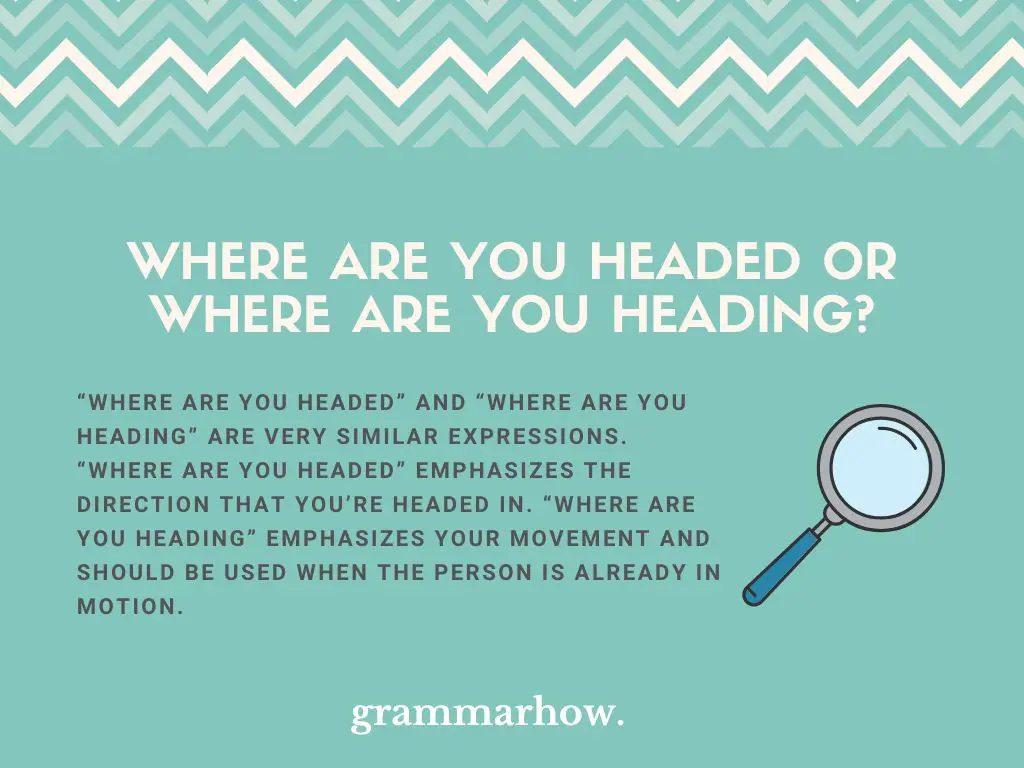English can be a little tricky, because you’ll often find two similar sentences that seem to express the same thing, and you’ll be unsure if they’re the same or different. Is “where are you headed” the exact same thing as “where are you heading”? This article will answer that question.
Where Are You Headed or Where Are You Heading?
“Where are you headed” and “where are you heading” are very similar expressions. “Where are you headed” emphasizes the direction that you’re headed in. “Where are you heading” emphasizes your movement and should be used when the person is already in motion.

However, don’t let the fact that one expression emphasizes movement and one emphasizes direction distract you, both are very much interchangeable with each other and the difference is incredibly small.
Where Are You Headed
“Where are you headed” is an expression that is used to ask someone the place that they’re headed towards, and it emphasizes the direction of their movement, as opposed to their movement itself. It’s a completely grammatically correct expression to use, and you can freely make use of it.
You can use “where are you headed” as a question towards anyone who is heading towards a place, and they are sure to understand what you mean without need of further clarifications or explanations.
Here are a few examples that are going to show you how you can easily use “where are you headed”:
- Where are we headed on today’s unexpected day trip outside of the city?
- Where are you heading in life once you graduate from university next spring?
- Where are you headed next after you stop by Spain, England and Italy?
- Where are you headed off to in such a hurry, my friend?
- Where are you headed next now that you’re no longer burdened by your regular activities?
Where Are You Heading
“Where are you heading” is an expression that is used to ask someone where they are going. This particular expression puts weight on the person’s movement itself, which is why you use “heading” instead of “headed”. You’d normally ask this question if the person is already in motion.
“Where are you heading” is a particularly useful question to use in situations in which someone unexpectedly starts going somewhere and you want to know the place that they’re heading towards.
Here are some example sentences that are going to show you how to use “where are you heading”:
- Where are you heading in such a hurry now that the general event is over?
- My mom was talking to me earlier and she said: “where are we heading afterwards?”.
- Where are we heading after the regular screening is over and we have to eat?
- Where are we heading in a situation where we stop getting replies from them?
- Where are we heading to celebrate once we’re finished with classes?
Which Is Used the Most?
According to information provided by the Google Ngram Viewer, “where are you headed” is more popular than “where are you heading” by quite a large lead, large enough to practically be referred to as insurmountable. “Where are you headed” is more than twice as popular as “where are you heading”.

It wasn’t always this way: In the 1950s, use of both expressions was limited, and they both were the most popular. This changed when “where are you headed” got a boost in popularity in 1995.
From around 1970 to 1995, “where are you headed” was still more popular, but the difference between both expressions was more limited, and it was only in 1995 that the gap became huge.
Final Thoughts
Both “where are you headed” and “where are you heading” are incredibly valuable and useful expressions to ask someone’s future location. The former puts emphasis on the person’s direction, while the latter emphasizes their movement. They can be used interchangeably with each other without any major issues arising.

Martin holds a Master’s degree in Finance and International Business. He has six years of experience in professional communication with clients, executives, and colleagues. Furthermore, he has teaching experience from Aarhus University. Martin has been featured as an expert in communication and teaching on Forbes and Shopify. Read more about Martin here.
